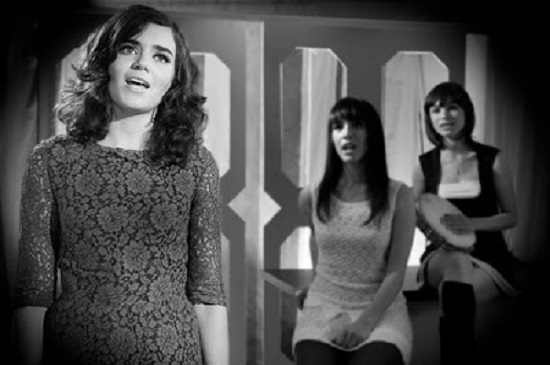For the past year or so, I had been listening to songs from God Help the Girl, in anticipation for the new film written and directed by Belle and Sebastian front man, Stuart Murdoch. For those of you not familiar with Belle and Sebastian, they're an indie pop band from Glasgow, Scotland, formed back in 1996 and often compared to The Smiths and Nick Drake. I've been a fan for many years and a couple of years ago I read about Murdoch writing material for a musical project he planned on developing. Over the course of a few years, in between shows and other commitments, he wrote songs from a female's perspective and the difficulties encountered as they enter adulthood. Although the instrumentation would be provided by Belle and Sebastian, he envisioned the singing done by female vocalists, so he took out an ad in a local Glasgow magazine and followed up with interviews being conducted via social media streaming. A few girls were selected from different parts of the world, and soon a full-length album and a few singles were released. Originally meant to show the bleak and arduous transition from adolescence to adulthood, the songs are paradoxically much more upbeat and catchy, reminiscent of Belle and Sebastian albums. But that is the point. When you're at a point of stellar devastation in your life, there's nothing better to do than dance and sing, and look for beauty within the absurd.
The opening of the new film, God Help the Girl, made its Los Angeles debut at the Laemmle Royal in Santa Monica a few weeks ago. Previously released in Europe, the band commented on the struggles of finding adequate distribution despite their global fan base. The first matinee was at 1:20 p.m. and I wanted to see the first showing. Stuart Murdoch was doing a Q and A in the last two showings of the evening, but I had a concert to attend planned months in advance and unfortunately I missed out. But there is something romantic about being at a small movie theater for an independent matinee away from the maddening crowd. Usually there are only a handful of patrons along with you, many who are retired elderly folks, and in a way it makes you feel as if you're playing hooky. Even if the film is execrable, the process itself is a throwback to golden times. If you've ever seen a Belle and Sebastian or Smiths video, the look and feel of the film is similar---simple and joyful, with a good sense of fashion. Think---parkas, desert boots, Fred Perry, Ben Sherman, thrift store vintage, Doc Martens, etc...and as the music began, (since its partially a musical) the songs made more sense. Listening to their music all year helped facilitate the narrative, and I'll have to say, I loved every bit of it. It wasn't life-changing, it didn't have a climactic inciting incident, nor was the dialogue fickle or complex, it was just fun...something we forget to do sometimes.
Back in 2007 I began collecting ideas about the difficulties of a young female going into adulthood. I conjured up a psychological thriller where the protagonist takes matters into her own hands and takes her personal vendetta too far. I began to pay more attention to the females around me, the ones who were gone, and the ones that played a significant role in my life. There were similarities amongst them, but also with my own life and it taught me that although men and women handle things differently, we feel the same things. Like Stuart Murdoch, I also wanted to tap into the female's bleak transition into adulthood throughout the college and post-collegiate years, although my medium was literature. I too envisioned a female narrator, to make it more believable so that the female audience could identify to the overall human condition of such a concept. My book, A Grave Situation, was released earlier this year, and even through a sneak-preview leaked to a few students in 2011, most of the females that read it and knew me were pleased with the outcome. Many completely forgot that a male wrote it. Albert Camus wrote that essentially all art is rebellious in nature, and its main function is to reconcile a wrong that has been done to the creator. For Stuart Murdoch, God Help the Girl was a way for him to reconcile with some of his own adolescent transitions to adulthood difficulties, similar to my own in A Grave Situation.
Photo Credit: Katie, 2010
